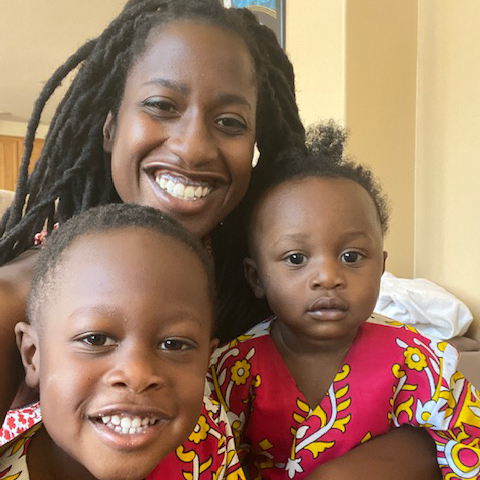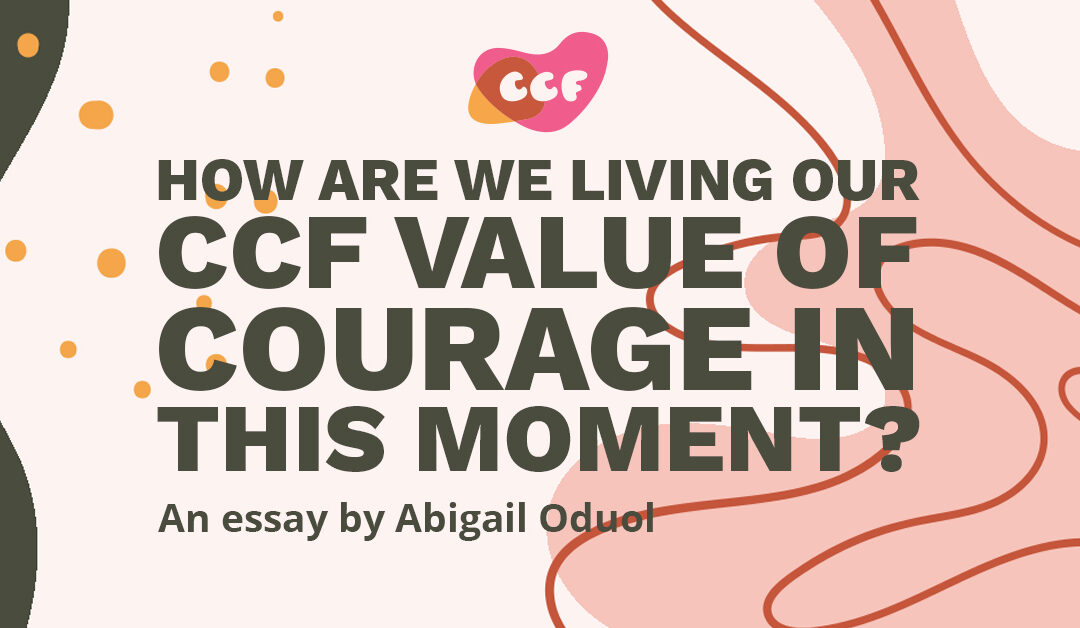By Abigail Oduol, a CCF Global Council Member
I ask all of us to reflect on that value of courage and consider: How are we living up to our value of courage in this space, context, and moment? And how are we falling short of living up to our value of courage in this space, context, and moment?
At the time of writing, the current administration has threatened law firms who have pursued litigation against administration officials in the past, with some capitulating to demand by giving the administration free legal services.
Many private companies (that are not subject to federal demands), have also quickly realigned themselves to the administration’s priorities.
In the philanthropic sector, schools are getting rid of their ethnic studies programs after the administration shared its goals of dismantling diversity, equity, and inclusion programs. And so many more similar stories of pre-compliance out of fear arrive on our screens each day.
When the CCF Global Council had its first retreat, we refined our strategic vision, connected, and reflected. What are our values in the movement? What do those mean for the way that we navigate through the world? What do those mean for the way that we navigate relationships with each other as individuals and as a group? And how do those synchronize (or not) with our own personal values? What do our values mean for how we show up in this space, and how do we really show up with those stated values?
This was not the only opportunity to discuss our values. We continually revisit them, and in one of our most recent Global Council meetings, we discussed them again with a focus on courage.
The Community-Centric Fundraising value of courage is something that is needed within the current context and moment.
Courage. We believe in challenging the way things have been done, including talking about difficult matters, taking bold actions, and embracing failure. We speak and act boldly, even if it causes discomfort and disagreement. We are not afraid to tackle difficult topics including race, slavery, reparation, colonization, anti-Blackness, and white supremacy. We try things that have not been done before.
We will not be mired in process and discussion, but will take actions once there is sufficient information to act. And we accept failure as part of learning.
I ask all of us to reflect on that value of courage and consider: How are we living up to our value of courage in this space, context, and moment? And how are we falling short of living up to our value of courage in this space, context, and moment?
This conversation is offered with the goal of thinking through each of our values in this way.
The following reflections from the Global Council have been edited for brevity and content:
Esther:
In a conversation with a professor of decolonization and anti-imperialist praxis on all sorts of things: US imperialism, Korea, Palestine, white supremacy—just the light stuff, right—he mentions how vocal I am in speaking about white supremacy in conversation. But he says, “When I went on your LinkedIn profile, you don’t talk about that at all.
“Like your bio, it just says ‘dismantle systems of power,’ but you never name colonialism, you never name capitalism, you never name white supremacy as you do now.”
I never thought about that. But I think the fact that I’m trying to make a livelihood has stopped me—even in my profile—being as visible and unapologetic about it, even though I am in my actual practice.
Why I say all this is: I think courage is something that has to be cultivated and practiced. I consider myself someone who is usually always trying to seek justice and do this work, but we’re all in a system that’s constantly trying to quiet that. And we’re all in a system that basically rewards you for not being vocal about it.
So I’m hoping that CCF Global Council can be a space where we can do that, too: where we can call each other in and push each other to be more courageous. Especially when it’s scary because let’s not forget that this sector is founded on people not saying the truth. And it’s actually founded on obscuring it and making you feel comfortable in that.
Martha Lidia:
Thank you, Esther. I think you’re not the only one. I feel like [that] in some cases—like in Guatemala with the new president, if someone else had won, I would feel slightly different.
But also, in this sector, at least in Guatemala, most of the directors are white. It’s still very challenging [to speak against white supremacy] because I’m the only [non-white] one. It’s easy to not say something and it feels—although it’s not personal—it really gets to the very personal level that is really hard to distinguish sometimes: that it’s not against “X” person, but it’s like [against] the system.
Meena:
It’s thinking, “How can I take my values and not just keep it in theory anymore, but how can I actually put it to practice?” I can talk about my values. I can talk about my beliefs. But how is it actually showing up when I’m in community, when I’m in activist spaces?
But also, how is that translating when I’m in professional settings? So for me, where it’s landing is that it takes a lot of courage to have uncomfortable conversations. And I don’t think people talk about how much discomfort exists in organizing, and in a movement building and building together, right? Many of us are incredibly intelligent and incredibly passionate; we were looking at the world through our own lived experiences.
And what I’m also kind of learning to do is like, take a step back, and like fully hear what other people are saying because their experiences and their intellect also matter in these spaces.
Esther:
Something my coach says—Nneka Allen of Collecting Courage—she says “Courage is on the other side of fear.” It’s actually when you’re scared is the opportunity to demonstrate courage. Otherwise, it wouldn’t be courage. So I think the fact that when we do get scared in these moments, that just means it’s the opportunity to demonstrate [courage].
Rachel:
I think for me, for the last years of doing consulting work [I] have really sort of made it a point to invest in organizations that are led [by] and center marginalized identities in sort of whatever way that means. And one of the artist’s projects that I took on was actually doing racial equity work with a white-led, white-centered organization. It has been rough. The people who are left are the people willing to do the work.
And when we talk about what it means to be a part of a movement, we have to be willing to get to the critical mass of people who have a shared vision, even if they don’t agree with the tools, even if they don’t agree with the power structure. And so I think for me, courage is figuring out two pieces of my professional work, and that’s how to be in transformative relationship with people I don’t agree with, and stay in it—like stay in relationship—and also beginning to acknowledge where abusive capitalism and class are destroying how we center the work.
So that is where I think I’m trying to be more courageous in my life.
Conclusion
So what does courage mean for us in this moment as a movement?
I’ve come from a group that has experienced much worse things than I am experiencing right now. I have ancestors who experienced slavery and Jim Crow and domestic terrorism from the KKK. Women who had to work for white families and didn’t get to care for their own. Women who made money but couldn’t have bank accounts. Who were fired for giving service to a white customer in a segregated space.
And here we are in this moment, exhausted and scared? What does it mean to have courage in this moment so that my story can be counted among the stories of my ancestors as someone who fought and endured the challenges of their time with joy and perspective for the opportunity to carry an ancestral burden?
We are here. We must show up with courage as our legacy.

Abigail Oduol
Abigail Oduol’s (she/hers) surname is not Irish or Pennsylvania Dutch. It’s Kenyan. Abigail serves on the CCF Global Council and is a member of too many committees. She invests time thinking about how popular culture informs fundraising and how people connect to each other. Follow Abigail on LinkedIn.
Discover more from CCF
Subscribe to get the latest posts sent to your email.

